Related Research Articles
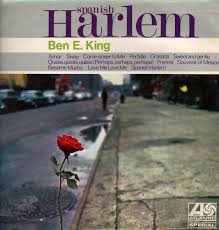
"Spanish Harlem" is a song recorded by Ben E. King in 1960 for Atco Records. It was written by Jerry Leiber and Phil Spector and produced by Jerry Leiber and Mike Stoller. "Spanish Harlem" was King's first hit away from The Drifters, peaking at number 15 on Billboard's rhythm and blues and number 10 in pop music chart.
"Pledging My Love" is a blues ballad. It was written by Ferdinand Washington and Don Robey and published in 1954.

"Abraham, Martin and John" is a 1968 song written by Dick Holler. It was first recorded by Dion, in a version that was a substantial North American chart hit in 1968–1969. Near-simultaneous cover versions by Smokey Robinson and the Miracles and Moms Mabley also charted in the U.S. in 1969, and a version that same year by Marvin Gaye became the hit version in the UK. It was also a hit as part of a medley for Tom Clay in 1971, and has subsequently been recorded by many other artists.
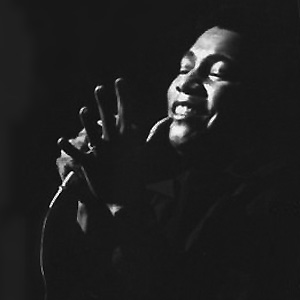
Luther Thomas Ingram was an American R&B and soul singer-songwriter. His most successful record, "(If Loving You Is Wrong) I Don't Want to Be Right", reached No. 1 on the Billboard R&B chart and No. 3 on the Hot 100 in 1972.

"(If Loving You Is Wrong) I Don't Want to Be Right" is a song written by Stax Records songwriters Homer Banks, Carl Hampton, and Raymond Jackson. Originally written for The Emotions, it has been performed by many singers, most notably by Luther Ingram, whose original recording topped the R&B chart for four weeks and rose to number 3 on the Billboard Hot 100 in 1972. Billboard ranked it as the No. 16 song for 1972.

"I've Been Loving You Too Long" (originally "I've Been Loving You Too Long (To Stop Now)") is a soul music ballad written by Otis Redding and Jerry Butler. Considered by music critics and writers to be one of Redding's finest performances and a soul classic, it is a slow, emotional piece with Redding's pleading vocals backed by producer Steve Cropper's arpeggiated guitar parts and a horn section.

"Until You Come Back to Me (That's What I'm Gonna Do)" is a song written by Morris Broadnax, Clarence Paul, and Stevie Wonder. The song was originally recorded by Stevie Wonder in 1967, but his version was not released as a single and did not appear on an album until 1977's anthology Looking Back. The best-known version of this song is the 1973 release by Aretha Franklin, who had a million-selling top 10 hit on Billboard charts. The song reached No. 1 on the R&B chart and No. 3 on the Hot 100 chart in 1974. It became an RIAA Gold record.

"Walk On By" is a song written by Burt Bacharach and Hal David for singer Dionne Warwick in 1963. The song peaked at number 6 on the US Billboard Hot 100 and number 1 on the Cash Box Rhythm and Blues Chart In June 1964 and was nominated for a 1965 Grammy Award for the Best Rhythm and Blues Recording.

"Déjà Vu" is a hit 1979 ballad written by Isaac Hayes with lyricist Adrienne Anderson, recorded by Dionne Warwick for her album Dionne which Barry Manilow produced. The song won Warwick a Grammy Award for Best Female R&B Vocal Performance at the 22nd Grammy Awards.

"Soul Man" is a 1967 song written and composed by Isaac Hayes and David Porter, first successful as a number 2 hit single by Atlantic Records soul duo Sam & Dave, which consisted of Samuel "Sam" Moore and David "Dave" Prater. In 2019, "Soul Man" was selected for preservation in the National Recording Registry as "culturally, historically, and aesthetically significant" by the Library of Congress. It was No. 463 in "Top 500 Greatest Songs of All Time" by Rolling Stone Magazine in 2010 and No. 458 in 2004.

"Caldonia" is a jump blues song, first recorded in 1945 by Louis Jordan and his Tympany Five. Although credited to Fleecie Moore, his wife at the time, Jordan is the actual songwriter. The song was a hit for Jordan as well as several other musicians.

"Going in Circles" is a song written by Jerry Peters and Anita Poree, and originally performed by The Friends of Distinction on their 1969 album Grazin', reaching number 15 on the U.S. Hot 100, and number three on the R&B chart. The song has since been covered numerous times by other artists, including Isaac Hayes and Luther Vandross. In addition, the song's co-composer, Jerry Peters released his own version of the tune on his 1972 solo album Blueprint for Discovery. The Friends of Distinction's original version is an R.I.A.A. Certified Million-Seller.
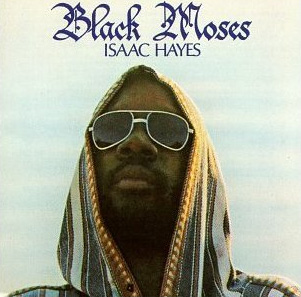
Black Moses is the fifth studio album by American soul musician Isaac Hayes. It is a double album released on Stax Records' Enterprise label in 1971. The follow-up to Hayes' successful soundtrack for Shaft, Black Moses features Hayes' version of The Jackson 5's hit single "Never Can Say Goodbye". Hayes' version became a hit in its own right, peaking at number 22 on the Billboard Hot 100. The album reached number one on the Billboard R&B album chart on January 15, 1972.
"634-5789 " is a soul song written by Eddie Floyd and Steve Cropper. It was first recorded by Wilson Pickett on December 20, 1965 and included on his 1966 Atlantic Records album The Exciting Wilson Pickett with backing vocals by Patti LaBelle and the Blue Belles. The single reached number 1 on the Billboard Hot Rhythm & Blues Singles chart and number 13 on the Hot 100 singles chart.
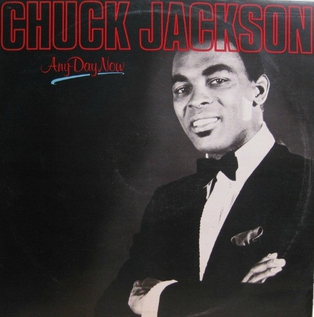
"Any Day Now" is a popular song written by Burt Bacharach and Bob Hilliard in 1962. It has been recorded by numerous artists over the years, including notable versions by Chuck Jackson in 1962, Alan Price in 1965, Elvis Presley in 1969, Scott Walker in 1973 and Ronnie Milsap in 1982. In the lyrics, the singer predicts the imminent demise of a romantic relationship and describes the sadness this will leave.
"Who's Making Love" is a song written by Stax Records staffers Homer Banks, Bettye Crutcher, Don Davis and Raymond Jackson and recorded by singer Johnnie Taylor in 1968.
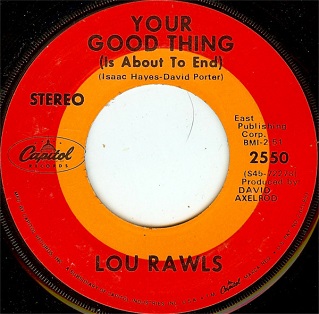
"Your Good Thing (Is About to End)" is a song written by Isaac Hayes and David Porter. The song was originally recorded by Mable John in 1966. It peaked at number 95 on the Billboard Hot 100 and number 6 on the R&B Charts.
"Funny How Time Slips Away" is a song written by Willie Nelson and first recorded by country singer Billy Walker. Walker's version was issued as a single by Columbia Records in June 1961 and peaked at number 23 on the Hot C&W Sides chart. The song has been featured in several live action films and television shows, such as in the first episode of the second season of AMC’s Better Call Saul and in the 2020 Netflix drama The Devil All the Time.
"Don't Let Go" is a song written by Jesse Stone. The song was first a hit for Roy Hamilton in 1958. The Roy Hamilton version reached number 2 on the R&B charts and number 13 on the pop charts.
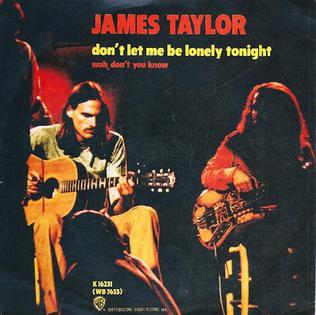
"Don't Let Me Be Lonely Tonight" is a song written and performed by American singer-songwriter James Taylor, from his 1972 album One Man Dog. The song has been included on three of Taylor's greatest-hits collection albums: Greatest Hits (1976), Classic Songs (1987) and The Best of James Taylor (2003). Taylor re-recorded the song for the 2001 Michael Brecker album Nearness of You: The Ballad Book; this rendition won Taylor the Grammy Award for Best Male Pop Vocal Performance in 2002.
References
- ↑ Whitburn, Joel (2004). Top R&B/Hip-Hop Singles: 1942-2004. Record Research. p. 563.
- ↑ Whitburn, p.344
- ↑ "Black Moses - Isaac Hayes | Songs, Reviews, Credits". AllMusic . Retrieved May 25, 2021.